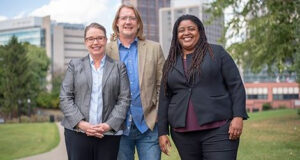 10/10/2019
10/10/2019
Kellen Stepler | staff writer
Two Duquesne University professors and one University of Pittsburgh professor have been givenfunding by a national leadership team from the Robert Wood Johnson Foundation to see if their innovative approach to holistic legal representation can improve the juvenile indigent defense representation.
Duquesne School of Law’s Tiffany Sizemore and School of Education’s Tammy Hughes are teaming up with Pitt’s Jeffrey Shook to create the “Team Pittsburgh” cohort of the Interdisciplinary Research Leaders (IRL) program. Their research project is titled, “Improving Juvenile Indigent Defense and Health through Holistic Representation.”
According to the IRL: Team Pittsburgh webpage, most youth enter the juvenile justice system with significant health, mental health and substance abuse issues and in turn are excluded from institutions and resources in the community.
“For many, their defense attorney serves as their primary advocate to help them obtain medical and mental health services and to connect them with supports and resources,” the research project description reads. “Most of these youth, however, are unable to afford an attorney and must rely on the indigent defense system, which provides the free legal defense services guaranteed in the Constitution.”
“Indigent legal defense raises equity concerns and represents a lost opportunity to connect young people with resources, supports and services that can address the health, mental health and substance use issues they experience,” the research project description reads.
A month ago, the city of Pittsburgh released a report highlighting the disparities between gender and race in the area. In Pittsburgh Public Schools, 20% of black girls and 33% of black boys are suspended every year. Additionally, black children receive police referrals at 3 to 5 times the rate as their white counterparts.
Sizemore said the report was deeply troubling, “especially in light of the fact that one instance of school exclusion increases a child’s chances of dropping out of school, and one referral to the juvenile legal system increases a child’s chances of getting additional cases.”
“The degree of overrepresentation of youth of color cannot solely be explained by offending patterns,” Hughes said.
Hughes notes a variety of reasons why youth of color are funneled into the juvenile justice system. Between poverty, disadvantage, certain law enforcement practices that target low-income urban neighborhoods where youth of color are likely to reside, institutional bias and racism and disparities in mental health and substance abuse treatment, youth of color will more likely be referred to the juvenile justice system and experience suspensions and expulsions.
“The overrepresentation of youth of color in the juvenile justice system include what is referred to as the school-to-prison pipeline,” Hughes said.
One approach to combat this problem is the Holistic Representation Model (HRM).
“HRM features interdisciplinary teams of professionals working together on youths’ cases. Minutes legal and clinical services, such that social workers, psychologists and/or counselors are collaborating with attorneys,” the research project description reads.
“[HRM] is based on the understanding that offering high-quality legal services requires interdisciplinary collaboration and training,” Sizemore said.
Led by the clinic’s supervising attorney, the team assesses all the client’s needs and executes a plan of representation with the client’s informed consent. These cases are staffed by law student attorneys, masters-level social workers from the University of Pittsburgh and doctorate-level students from Duquesne’s School Psychology program, according to Sizemore.
“Holistic representation seeks to address both the consequences of the criminal case as well as the complex and confounding factors that brought the individuals into the justice system,” Hughes said.
HRM looks at everything surrounding the case and the client’s needs – not just the legal issues.
“In our project, HRM team engages collaboratively to work on the client’s legal, community and school needs; we advocate for and connect clients with supportive services to address these needs,” Hughes said.
The group uses empirical data to determine if the process is keeping kids in school, and out of jail.
“The clinics have an IRB-approved traditional research study which seeks to validate the results of the holistic representation model by following our clients in both the short- and long-term to find outcomes across a variety of relevant domains for future indicators of success,” Sizemore said.
Hughes notes that the goals of this project are not only to conduct “rigorous research,” but also to improve the health, mental health and educational outcomes for youth who have juvenile justice contact. While Hughes knows that the challenges in the community are complicated, the team is thrilled to be part of a group selected to do this work.
“Ultimately we are working to support children, I think of that as ‘keeping kids in school and out of jails,’” Hughes said.
“Improving the lives of our community’s children is the end goal of all of this work,” Sizemore said.
